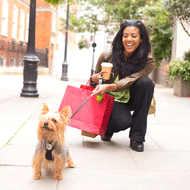
Dogs Trust offers advice for keeping dogs safe in busy shops
Retailer John Lewis has decided to allow customers to bring well-behaved dogs into its shops, with immediate effect.
The company confirmed the news on Twitter in response to a customer query. It is one of only a handful of major high street retailers that allows dogs.
The post read: ‘We’ve decided to allow all customers, not just those with assistance dogs, to bring their dogs into our shops with immediate effect. Well behaved dogs only will be allowed in our shops and they must be on a fixed lead at all times, unless they are being carried.’
Responding to the news, the Dogs Trust said: "We are pleased to see a major high street brand open the doors of its stores to all dogs, reducing the risk of dogs being left at home, unattended in the street or in the car for long periods of time.
"If we want more stores to follow in their pawprints, it’s important for all dog owners to make sure their dog's etiquette in shops is up to scratch.”
The charity offered some top tips for keeping pets safe and relaxed in busy shops, including:
- always keep your dog on a lead
- if you have a small dog, consider carrying them around to prevent them being caught underfoot on a busy shop floor
- consider how sociable your dog is and whether they will be comfortable walking through the hustle and bustle of the retail jungle, with distractions around every corner
- be respectful of other shoppers, not everyone is going to be as comfortable around dogs as you are
- you know your dog best, so consider what they might get excited by in the store, how they might react and any areas of the store you may need to avoid
- check whether there are restrictions for going into certain areas of the store
- be aware of other dogs in the store. If you do meet a dog when out and about, always approach them slowly, calmly and quietly. Don’t walk directly towards their head or face. Always greet a dog from the side giving them as much space as possible.



 The Veterinary Medicines Directorate (VMD) is inviting applications from veterinary students to attend a one-week extramural studies (EMS) placement in July 2026.
The Veterinary Medicines Directorate (VMD) is inviting applications from veterinary students to attend a one-week extramural studies (EMS) placement in July 2026.